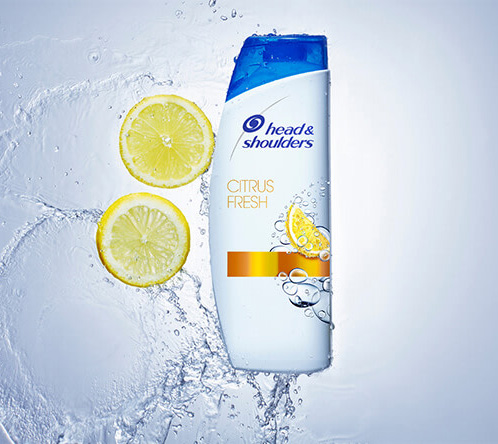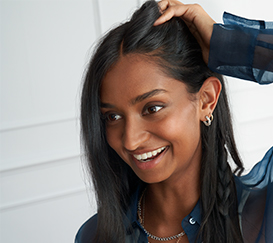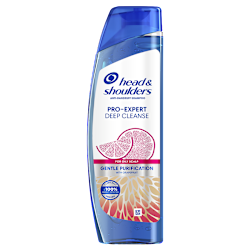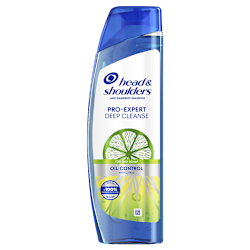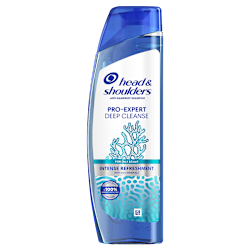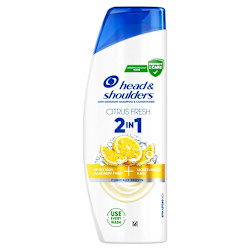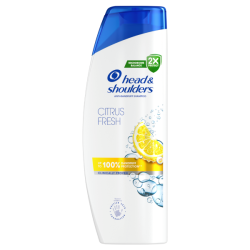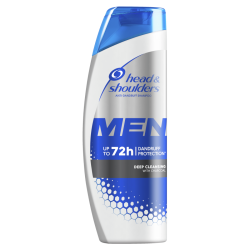Sebum buildup on scalp: how to get rid of sebum excess?
- In this article:
- Go to sectionWhat is sebum and what’s the “sebum cure”?
- Go to sectionAre too many ingredients bad?
- Go to sectionDoes shampoo make hair greasy and will the “sebum cure” help?
- Go to sectionThe problem with the “sebum cure” and no poo
- Go to sectionHow does shampoo work?
- Go to sectionWhat about natural shampoo alternatives?
- Go to sectionIs washing often good for my hair?
This article has been reviewed by Dr. Rolanda Wilkerson
Senior beauty scientist
At home wondering if skipping hair washes can have a positive impact on the condition of strands? After all, if you’re stuck at home and nobody can see the grease and oil build-up, it might seem like the perfect opportunity. But before you take advantage of a clear social calendar by skipping your hair wash routine, here’s what you need to know about this newfound “sebum cure”…
There are various forms of alternative shampooing and hair washing methods that have gained popularity in certain circles. This includes the no-poo movement which involves washing your hair without using shampoo.
Advocates of no poo claim that modern shampoos do more harm than good, and so have searched for other ways of cleaning their hair.
There are as many different forms of no poo washing as there are shampoo brands, including:
using nothing more than water
using baking soda in place of shampoo and apple cider vinegar as a conditioner
complicated home remedy concoctions like rye flour, eggs and even clays
Effectively, the idea is to either use no product at all, or to use a product that is thought to be gentler than a regular shampoo.
Even through the no poo movement has gained popularity, some people are still on a quest to regulate dandruff and greasy hair concerns and with it a new movement has arisen- the “sebum cure”. But what exactly is sebum, what does it do to our hair and scalp and how is it caused?
What is sebum and what’s the “sebum cure”?
Sebum is oil naturally produced by glands on your scalp. If you’e wondering ‘what causes sebum?’, it’s formed from the sebaceous gland and the oily substance is created as a natural lubricant deposited on hairs to bring it to the skins surface.
Skipping hair washing all together for a long period of time, sometimes for a month or more to self-regulate sebum production all with the aim of achieving healthy hair is the premise behind the “sebum cure”.
There are a lot of reasons that people decide to use alternative hair washing methods, with a primary reason most often given is skepticism about chemicals.
Some people worry about why shampoos have so many ingredients, and whether they’ll be harmful to their health. Some people believe that skipping shampoos and washing all together as a “sebum cure” will result in healthier hair by self-regulating the production of the scalp oil. Others claim that chemicals found in shampoos are ineffective for cleaning.

Are too many ingredients bad?
In reality, each ingredient in a modern shampoo has an important job. Some jobs are obvious - like helping the shampoo lather and cleanse, and keeping your hair soft and manageable.
Other hard-working ingredients perfect the shampoo’s texture and spreading, protect it from contamination and keep your scalp and hair healthy.
All these combine to make the best possible washing experience for you.
Does shampoo make hair greasy and will the “sebum cure” help?
Some no poo and “sebum cure” advocates worry that shampoos strip away all the natural oils. They believe this dries out the hair and scalp, possibly triggering the scalp to overproduce oil to compensate.
The argument goes that this effect creates a ‘vicious cycle’ that forces shampoo users to wash their hair more often.
The truth however, is that your body produces oils at a pretty constant rate - no matter how frequently or infrequently you shampoo. And cleansers in shampoos simply remove excess oils (sebum) that are produced by our scalps.
The problem with the “sebum cure” and no poo
It turns out, using popular no poo options and forgoing hair washing altogether might actually harm your hair and scalp health. An even slightly critical look at both movements brings all sorts of problems with its practice and the logic behind it.
Modern shampoos are designed to clean away scalp oils and dirt, without stripping natural moisture.
The fact is, it’s very important for scalp and hair health to regularly remove excess oil.
No poo and no wash routines that don’t clean adequately can actually make your scalp and your hair unhealthy.
Oil that builds up on the scalp changes and becomes oxidized- breaking down into substances that not only smell bad, but may also make your scalp itchy and or flaky- creating a perfect environment for an ongoing unhealthy scalp. The cumulative effects of this can have a negative impact on the hair which emerges from the scalp unhealthy.
Scientists have measured the level of hair damage when the scalp is unhealthy. It has been proven that an unhealthy, oily scalp produces unhealthy hair. The good news- with regular scalp care, the hair can emerge from the scalp healthy- a benefit that those using alternative hair washing methods are desperately seeking.
How does shampoo work?
Modern shampoos are carefully formulated to be kind to your scalp.
Shampoos work by binding to the excess oils on your scalp, and dissolving them in water so they can be rinsed away.
It is actually important to remove excess oil - left unchecked, oil build-up will bind your hair in clumps, and attract dust, pollen, pollution and other dirt.
Simply using the right amount with the correct frequency will prevent your scalp from being completely stripped, while keeping your hair clean and fresh.
Shampoos carry other benefits as well:
protect your hair from damage and keep it healthy
condition to keep your hair smooth and detangled
protect your scalp’s natural pH balance
make your hair smell great (not like apple cider vinegar!)
What about natural shampoo alternatives?
The other problem with the no poo and “sebum cure” trend lies in the alternatives used to try and keep hair clean.
The most popular natural cleaning routine is a combination of bicarbonate of soda for shampoo, and apple cider vinegar for conditioning.
Bicarbonate of soda is great for baking, but for hair it has several important drawbacks:
It is highly alkaline – it has a much higher pH than your skin. This means that it easily upsets the pH balance of your scalp, which can lead to discomfort.
The imbalance created by using it regularly may actually damage your hair.
It is not a good oil absorber or an effective cleaner- leaving behind a lot of.
Likewise, remedies like eggs and clay are also ineffective at properly cleaning hair, and they’ve never been proven to work on scalp issues like dandruff, itch or dryness.
Is washing often good for my hair?
In recent studies, technical measurements were taken to understand the condition of the hair and scalp of people who washed their hair at varied frequencies (from once a week to daily). The panelists also shared their own perception of how their hair and scalp felt.
Interestingly, scientist discovered that washing at least 5 times per week was an optimal frequency for hair and scalp health and personal satisfaction. People who normally washed once a week were asked to replace their regularly used shampoo with Head & Shoulders and use it daily. Using technical measurements, scientists evaluated the improvement in hair quality and the change in scalp health.
In both cases, the scalp and the hair health were improved and so was the panelist’s satisfaction. So, washing hair regularly, more frequently, with a shampoo like Head & Shoulders Classic Clean Shampoo can bring about desired benefits not only for the scalp but also for the hair.

